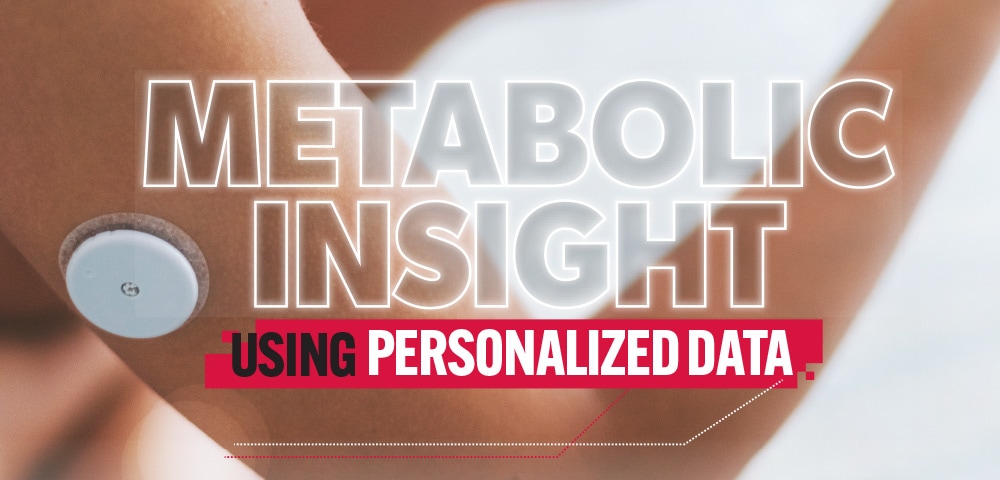
On a recent balmy day, I was strolling through the city with my family when my son pointed to a fit-looking, tank-top-clad woman and said, “Mom, that lady has a sticker like Amy’s.” My son recognized the roughly 2-in diameter, round “sticker” on the back of the woman’s upper arm as the sensor for a continuous glucose monitor (CGM).
CGM is a technology that monitors blood sugar levels every few minutes around the clock. Amy is a girl in my son’s class who has diabetes and relies on the monitor to check her blood sugar automatically.
As the day wore on, we noticed another woman and a couple sporting CGM sensors, all similarly fit-looking 30–40-something-year-olds. Could these people all have diabetes? The sensor wearers we saw were younger and fitter than the average adult-onset diabetic. And how common were diabetic couples anyway? That’s when I smelled a trend.
CGM IS HOT – METABOLIC INSIGHT USING PERSONALIZED DATA
There’s a good chance that most people we spotted that day didn’t have diabetes, and it is more likely that they are part of the growing trend of taking advantage of CGM technology to hack their health. For those in the know (and those with the dough), CGM is a cutting-edge wellness trend that promises to help you crack the code and discover how your body responds to what you’re eating. Simple strategies on food pairing, or eating foods in a certain order can drastically reduce blood sugar spikes.
WHY STABILIZE BLOOD SUGAR?
Maintaining stable blood sugar is vital, even for people without diabetes. When blood sugar spikes and drops rapidly, the brain sends out powerful messages to eat, which causes food cravings, drives people to overeat, leads to weight gain, and wreaks havoc on health. Plus, increased glucose instability in nondiabetics is associated with increased risk of cardiovascular disease, Alzheimer’s disease, and heart disease. Lab-based blood sugar testing on a single morning may show a normal result, but continuous monitoring shows the individual how their blood sugar responds to what they eat and how susceptible they are to spikes throughout the day.
You may think it’s not rocket science. Just avoid carbs and sugar… right?
Recent, groundbreaking research shows that individuals respond differently to eating carbohydrates. Foods that might seem obvious blood sugar boosters, like a banana or ice cream, may spike blood sugar for one person but not for another. In other words, there isn’t one true blood-sugar-balancing diet for everybody. That’s why CGM monitoring has become so popular.
WHICH FOODS ARE BLOOD SUGAR FRIENDLY FOR YOU? ENTER CGM TECHNOLOGY
While the devices have been available by prescription for diabetics for years, many new companies now offer CGM without a prescription. Celebrities and athletes are wearing the sensors and extolling the benefits on social media, maybe because they are currently among the few who can afford them. Subscription costs for a year of sensors can run into the thousands, and you will need to download the app to interpret the sensor data. Fortunately, users report that wearing the sensor for as little as one or two months was enough to provide valuable health insights into their eating habits. CGM adopters share seeing their real-time blood glucose response as “eye-opening,” helping them make better food choices because the monitor shows blood sugar volatility and stress-related blood sugar bumps. Plus, the positive effects of exercise would have gone unnoticed without daily monitoring.
STABILIZE BLOOD SUGAR NATURALLY
Individuals who experience food cravings that drive them to overeat have options. Research-rich, patented super fibres are available in natural health stores and, when taken with meals, can slow digestion and promote healthy blood sugar levels to curb cravings all day. Users report successful weight loss and improved health using super fibres before eating meals.
cravings all day. Users report successful weight loss and improved health using super fibres before eating meals.
Ultimately, if you love to track your steps, sleep, or anything else, and the cost is not an issue, then TRACKING DAILY BLOOD SUGAR might be a revelation to help you make better choices.














